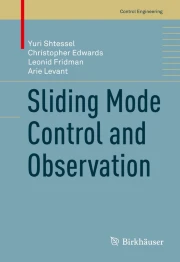Overview
- Provides the reader with a broad range of material from first principles up to the current state-of-the-art in the area of sliding mode control and observation
- Practical case studies, which present the results of real sliding mode controller implementations, are used to illustrate the successful practical application of the theory
- Exercises are provided at the end of each chapter
- Includes supplementary material: sn.pub/extras
Part of the book series: Control Engineering (CONTRENGIN)
Access this book
Tax calculation will be finalised at checkout
Other ways to access
About this book
The sliding mode control methodology has proven effective in dealing with complex dynamical systems affected by disturbances, uncertainties and unmodeled dynamics. Robust control technology based on this methodology has been applied to many real-world problems, especially in the areas of aerospace control, electric power systems, electromechanical systems, and robotics. Sliding Mode Control and Observation represents the first textbook that starts with classical sliding mode control techniques and progresses toward newly developed higher-order sliding mode control and observation algorithms and their applications.
The present volume addresses a range of sliding mode control issues, including:
*Conventional sliding mode controller and observer design
*Second-order sliding mode controllers and differentiators
*Frequency domain analysis of conventional and second-order sliding mode controllers
*Higher-order sliding mode controllers and differentiators
*Higher-order sliding mode observers
*Sliding mode disturbance observer based control
*Numerous applications, including reusable launch vehicle and satellite formation control, blood glucose regulation, and car steering control are used as case studies
Sliding Mode Control and Observation is aimed at graduate students with a basic knowledge of classical control theory and some knowledge of state-space methods and nonlinear systems, while being of interest to a wider audience of graduate students in electrical/mechanical/aerospace engineering and applied mathematics, as well as researchers in electrical, computer, chemical, civil, mechanical, aeronautical, and industrial engineering, applied mathematicians, control engineers, and physicists. Sliding Mode Control and Observation provides the necessary tools for graduate students, researchers and engineers to robustly control complex and uncertain nonlinear dynamical systems. Exercises provided at the end of each chapter make this an ideal text for an advanced course taught in control theory.
Similar content being viewed by others
Keywords
Table of contents (8 chapters)
-
Front Matter
-
Back Matter
Reviews
From the book reviews:
“This book covers several different topics related to sliding mode control and observation. … The book succeeds in being reasonably self-contained. A reader, such as a graduate student … will find most of the book very accessible. Also, as a collection of recent results and applications, the book is a valuable reference for researchers and engineers in the field of robust control of complex and uncertain nonlinear dynamical systems.” (Elisabetta Punta, Mathematical Reviews, August, 2014)Authors and Affiliations
Bibliographic Information
Book Title: Sliding Mode Control and Observation
Authors: Yuri Shtessel, Christopher Edwards, Leonid Fridman, Arie Levant
Series Title: Control Engineering
DOI: https://doi.org/10.1007/978-0-8176-4893-0
Publisher: Birkhäuser New York, NY
eBook Packages: Engineering, Engineering (R0)
Copyright Information: Springer Science+Business Media New York 2014
Hardcover ISBN: 978-0-8176-4892-3Published: 01 June 2013
Softcover ISBN: 978-1-4899-9122-5Published: 24 July 2015
eBook ISBN: 978-0-8176-4893-0Published: 01 June 2013
Series ISSN: 2373-7719
Series E-ISSN: 2373-7727
Edition Number: 1
Number of Pages: XVII, 356
Number of Illustrations: 168 b/w illustrations
Topics: Systems Theory, Control, Control, Robotics, Mechatronics, Vibration, Dynamical Systems, Control, Mathematical and Computational Engineering, Engineering Design
